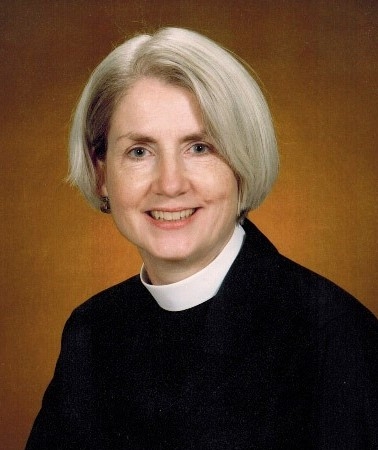Deacon Reflection: A Place for Conversation

By The Rev. Maggie Silton
For the 2019 deacon retreat, we’ve been asked to bring pictures of ourselves engaged in our ministries. My particular ministry doesn’t lend itself to photography, as confidentiality is an integral part of my work in the world. What is my ministry? It is a ministry of listening. I offer my ear and my attention to people whose lives often lack both: the poor and the homeless. The other thing these same people often live without is privacy, so I offer them that as well.
The path to this ministry was long and rather circuitous. Thirty years ago I was neither a church goer nor a person much involved in community service. But a move to a place where the homeless population was visible struck a chord in me. The local homeless folks included women and children, which as a then-young mother tugged at my heart. Raising a family with a comfortable home and all the accompanying advantages was challenging enough. The idea of trying to keep children well and safe when the next meal and the next bed weren’t certain was unimaginably awful. At the downtown Episcopal church where I lived, I started out volunteering with the children in the church’s transitional housing for women, began attending bible study, and eventually found myself in the pew on Sundays.
Another move led me to St. Peter’s, Charlotte, and its soup kitchen. As a weekly volunteer, I prepared food, served it and cleaned it, but over time my focus began to move from the food to the people. Over and over again, I saw many of the negative stereotypes of homeless people get broken. The man who others avoided on the street removed his hat and prayed before starting his meal. Another who had so little offered his slice of pizza to the person behind him in line when it was clear we didn’t have enough for everyone. There wasn’t much time for conversation in this setting, but I became aware that the people who came to eat brought their stories with them. The experience of participating in Education for Ministry showed me that my work wasn’t just community service, it was ministry as well.
Fast forward to another move, to Chapel Hill this time, and study at Duke Divinity School. Part of my M.Div. included some supervised work at Urban Ministries of Durham, where I interviewed clients of the clothing closet and food pantry. This setting provided more opportunity for conversation, sometimes conducted in my poor Spanish and the clients' somewhat better English. The following year I participated in a nine-month long Clinical Pastoral Education (CPE) unit with an urban ministry focus. My clinical setting was the Inter Faith Council’s (IFC) Community Kitchen in Chapel Hill. I spent about 10 hours per week in conversation over lunch with clients, volunteers and staff. While some people had no interest in talking to a chaplain, many people clearly hungered for someone to tell their story to, or even just to have a fairly mundane conversation with. While the kitchen manager was initially skeptical about the value of my work (and I was too, somewhat), it became clear that being a friendly face and a listening ear had considerable value to those who had neither in their everyday lives.
So providing a place for conversation is the ministry that found me, and it continued long after the CPE unit ended. I’ve spent many years at the IFC kitchen simply greeting and striking up conversations with the people who come to eat. The conversations range from the daily struggles in dealing with public transportation to questioning life’s purpose. Some might be surprised about how many conversations involved books, for many of our regular visitors always came in with a book in their hands. A man I’ll call J had always struggled to read until he discovered science fiction and found a true passion that turned him into a proficient and avid reader.
In addition to talking with and supporting the kitchen’s clients, establishing rapport with and providing support to staff has been part of my portfolio. I came to function as kind of a safety valve for D when she was the kitchen manager, a job she performed admirably and compassionately despite the job’s many inherent frustrations: a constantly variable food supply, frequent equipment breakdowns and an ever-changing cast of volunteers. While I thought I was bringing Christ into the kitchen, I found that thanks to D’s understanding and occasional tough love that she offered to clients, that he was already there. One of the greatest privileges I’ve ever had in ministry was to preach at D’s memorial service when she died too soon. The greatest lesson this experience has offered is that ministry is not just something we do for others. Ministry is something we do for and with each other as we live into the commandment to love our neighbors as ourselves.
Tags: Deacon Reflections / Discernment
